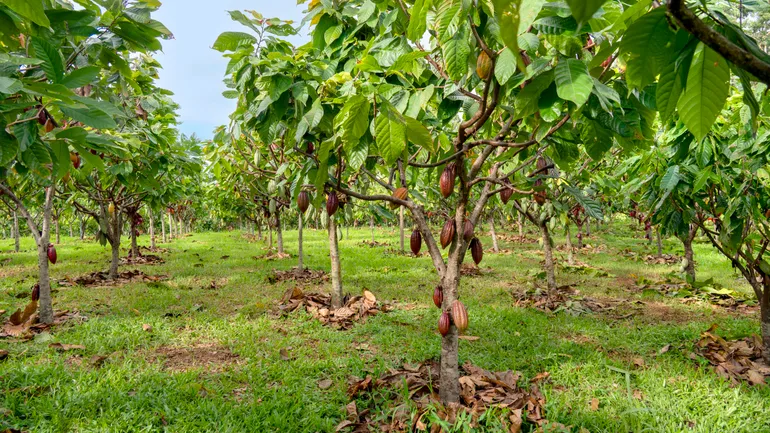Dive Brief:
- Nestlé and Ofi announced they will invest in a regenerative agriculture partnership that will help reforest land in cocoa-growing regions devastated by clear-cutting and deforestation. The efforts are estimated to cut 1.5 million tons of carbon over the next three decades, according to the companies.
- The project aims to give 25,000 farmers across Brazil, Nigeria and Ivory Coast training and financial support to transition to agroforestry and integrate climate-friendlier crop residue management into their operations.
- The companies’ goal is to plant 2.8 million trees spanning 72,000 hectares, which will be verified by a third-party source. Planting and farmer training has already begun in the three cocoa growing regions.
Dive Insight:
Deforestation has become one of the most pressing sustainability issues in the chocolate industry. Seventy percent of the illegal deforestation in the top-producing Ivory Coast is considered to be related to cocoa farming.
Nestlé, the largest global food company, aims to boost its sustainability credentials with the help of a prominent processor in the cocoa ingredients space. The companies say the collaboration is their largest-ever joint cocoa agroforestry partnership to reduce carbon emissions and combat deforestation.
The project will include teaching farmers how to implement regenerative farming practices like planting shade trees beside cocoa trees, composting and mulching cocoa pod husks to bolster the biodiversity of the soil. Ofi is using an internal AI system to geolocate the trees planted to track the amount of carbon sequestered, the ingredients giant said.
Regenerative agriculture, which is loosely defined as any farming technique that actively works to sequester carbon from the atmosphere into soil, often aims to improve soil health without the use of heavy fertilizers. Some green groups warn that “regenerative agriculture” can amount to greenwashing when not paired with tangible goals of what the practices can achieve.
Deforestation in cocoa-growing regions has been linked to 110,000 hectares worth of biodiversity loss in Ivory Coast annually, according to Stockholm Environment Institute data.
Nestlé, a major chocolate producer, in recent years has made more overt efforts to showcase its cocoa sustainability efforts. Last year, the company debuted Sustainably Sourced chocolate, a confectionery brand made from cocoa certified by the Rainforest Alliance.






